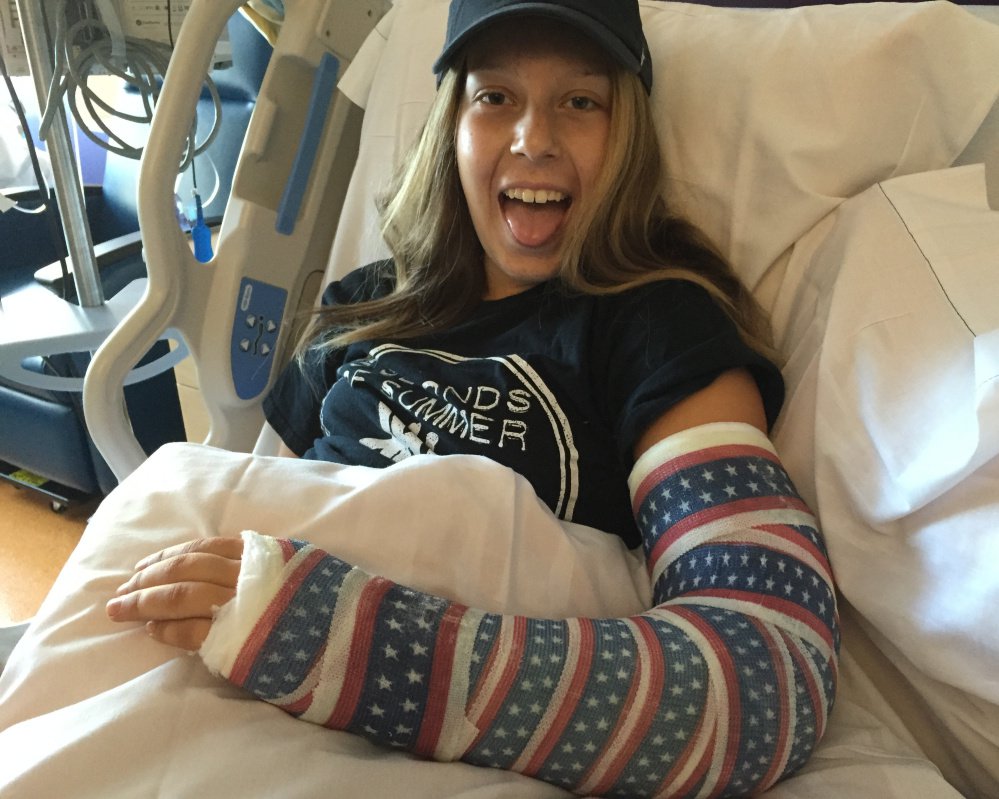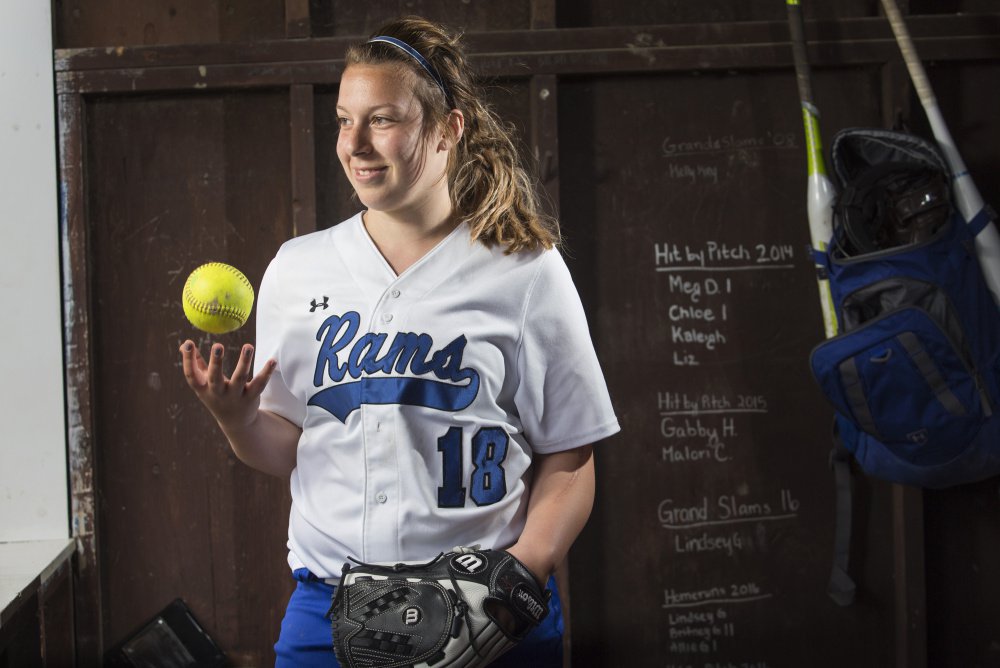Sydney Waitt stands at the back of the pitcher’s circle on Kennebunk High’s softball field, right hand at her hip, twirling the ball until she finds the right grip.
Then she steps to the rubber, bends at the waist, and in one quick motion windmills the ball toward home plate. The pitch ends up high and, with the bases loaded, allows a run to score.
Two years ago, maybe that pitch would eat at Waitt. But on this wet, chilly afternoon, she shows no emotion. Waitt, a 17-year-old junior, has a different perspective on softball – and life – these days.
Two years ago, as a freshman, Waitt was diagnosed with a rare bone cancer, Ewing sarcoma, that had spread from a tumor on her left arm to her lungs, leaving her with a cure rate of less than 30 percent.
She endured a surgery that removed two-thirds of the radius bone in her left arm and several intensive rounds of chemotherapy and radiation. She lost her hair, can no longer rotate her left arm palm up – forcing her to catch nearly everything backhanded – and had to learn how to bat left-handed.
Waitt now is cancer-free, according to her pediatric oncologist, Dr. Stanley Chaleff of the Maine Children’s Cancer Program in Scarborough. But she must undergo periodic exams to make sure the cancer has not returned.
“I think I’ve definitely learned to, I would say, not take things for granted,” said Waitt. “I may have walked three people, but I’m on the pitcher’s mound. Everything has to be put into perspective. I feel extremely fortunate.”
Waitt returned to play softball for the Rams a year ago, but the chemo treatments left her body weakened and she was not able to contribute much. Stronger this school year, she played soccer in the fall and unified basketball in the winter. Her full return this spring, as a pitcher and outfielder, has given the softball team a boost.
She hit a game-winning single in Kennebunk’s first victory of the season. But her mere presence has given the Rams their biggest lift.
“It gives you a reason not to give up,” said Kylie DeFeo, her best friend and a softball teammate. “If she’s over there cheering everyone on and trying her best and doing well, it makes it easier to keep going and keep trying when things are hard.”
SCARY PROGNOSIS
Waitt was warming up to pitch during a preseason scrimmage two years ago when she noticed a lump on her left forearm. It hurt.
She showed it to her coach, Kortney Nedeau, and they decided it would be best if she didn’t pitch until it was checked out.
“Everyone thought it was a hematoma (a mass of clotted blood),” said Nedeau. “They thought maybe there was an infection. So they put her on infection medicine.”
Waitt played her freshman season. The lump never went away. After it started to bother her again as she was preparing to play for her travel team, Waitt went to the family doctor for an X-ray.
The next day, her father got a call at work. “They wanted to know if I could bring her in for an MRI in an hour and a half,” said Al Waitt. “I was an hour away, so I raced back, called school and took her. Three hours later, we were hearing that that white thing that’s jumping out of the X-ray, that’s a tumor.”
That was June 10, 2015. “You really can’t believe what you’re hearing,” he said. “We watch all the Jimmy Fund stuff, we’re Red Sox fans, and you never think that you’re going to be that person or your kid is going to be that person, one of those kids.”
Ewing sarcoma is rare. According to Chaleff, “We see two to three cases a year in Maine.” Nationally, he said, there are only about 600 cases a year. By comparison, he said there are about 4,000 cases per year for leukemia, the most common childhood cancer.
Ewing sarcoma is a cancerous tumor that grows in the bone or the soft tissue surrounding it. While its cause is unknown, it occurs mostly in children or young adults ages 10-20, affects boys slightly more than girls, and has a fairly high cure rate (70 percent). However, if it spreads to the lungs, as it did with Waitt, that cure rate drops below 30 percent.
“It was one of those cancers that didn’t even make sense,” said Kim Waitt, her mother. “It’s random. The first thing the doctor said is there’s nothing you could have done – if you ate more broccoli, if you didn’t sit so close to the TV, it wouldn’t have mattered. It’s that crazy luck of the draw, or bad luck of the draw.”
Waitt’s treatment included chemotherapy (which eliminated the nodules in her lung, according to Chaleff), surgery that was performed at Dana Farber Cancer Institute in Boston (to remove the tumor on the radius bone), more chemotherapy, then three weeks of radiation. Following surgery, her left arm was in a full-length cast. Waitt – who pitches right-handed but writes left-handed – had to learn to write right-handed.
She kept up with her classes via Skype and still earned high honors, and she tried to live as normally as possible, despite spending up to five days at a time in the hospital receiving chemotherapy.
“She never once said, ‘Why me?’” said Kim Waitt. “She even said one time, ‘I’m glad it’s me and not one of my friends or family because I can handle this.’ And she always looked at her life beyond this, and that this was just a stinky blip in the screen. This was not going to be what defined her. She was incredibly strong and incredibly concerned about people around her, and I think pretty humbled by all the attention and the response of the people.”
Her summer travel team, New England Legacy, held a dance for her. Church suppers were held. T-shirts saying “Sydney Strong” were sold at the high school. Teammates and opponents wore yellow ribbons (for bone cancer) with her uniform number (18).
DeFeo went to the hospital with Sydney for her first chemotherapy treatment and spent almost as much time there as the family. “I tried to get up as much as I could to make her comfortable, bring her food, distract her a little,”said DeFeo. “It was hard because sometimes she’d get really sick.”
Her final chemotherapy was in January 2016; her final radiation treatment was the following month.
“As of last February, I was declared cancer-free,” said Waitt.
BACK IN UNIFORM
She returned to the softball team in 2016, weakened physically, now a left-handed hitter and only able to play in nine games. But Nedeau said her presence was all the team needed.
“She has such a big spirit about her,” said Nedeau. “She makes it happen, always has a positive attitude. She’s a leader, shes confident, she’s fun, she’s happy.”
This year, she has helped Kennebunk to a 6-5 record in Class A South. Waitt is 2-1 with a save, and she’s hitting .223, still impressive considering she never batted left-handed until after she was diagnosed with cancer.
“To see where she was and how far she’s come back, it’s just really nice,” said DeFeo.
Waitt still isn’t done with treatment. As Chaleff said, “She’s with us for an incredibly long time.”
She continues to undergo periodic tests, such as X-rays, CT scans and MRIs, to make sure the cancer hasn’t returned. Because the chemotherapy was so potent, she also needs electrocardiograms and echocardiograms to make sure her heart hasn’t been affected. Blood work is required to make sure leukemia doesn’t develop.
She recently completed a set of scans and was told she didn’t have to return for four months. Previously, she had scans every three months, so this was big news.
“Her prognosis is excellent,” said Chaleff. “I fully anticipate her being someone to lead a long and healthy life.”
Waitt plans to study humanitarian aid in college, perhaps at New York University or Fordham. She wants to give back. She doesn’t believe there is anything she can’t do.
“You need to stay positive,” she said. “Whenever it got bad, I would tell myself there is always someone out there with it worse than you. You’ve got to focus on the good things around you and keep persevering.
Send questions/comments to the editors.




